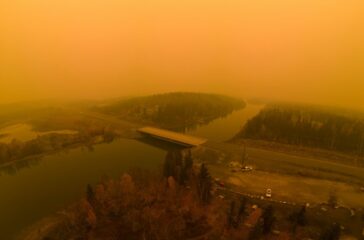Climate change may be driving extreme fires far ahead of schedule, study warns
By Dana Drugmand
Last year’s record-shattering Canadian wildfire season was directly linked to human-caused climate change, according to a new study, which warns that the climate crisis may be fueling extreme fires decades earlier than previously expected.
This is the largest assessment specifically of Canada’s 2023 fire season, which was unprecedented in its scope and intensity, and adds to a wider body of evidence showing that climate change is fueling dangerous fires around the world at a rapidly growing pace.
“What was unusual is the amount of activity across the country,” said Piyush Jain, a research scientist with Natural Resources Canada’s Canadian Forest Service and a lead author of the study, which published this week in the journal Nature Communications. “Already we saw a year which would be as extreme as what we would expect to see in 2050.”
Fires burned across much of Canada from April through October 2023, torching an area roughly the size of Illinois – seven times more land than has historically been burned during the country’s wildfire season, on average. The extent of last year’s fire activity, stretching from British Columbia all the way east to Nova Scotia in a single season, had not been anticipated until later this century under current climate projections, according to researchers.
The wildfires in Canada last June also affected major cities on the East Coast of the US, turning skies a hazy orange and bringing alarming air pollution levels to New York City, Philadelphia and Washington, DC. Toxic particulates carried on the wildfire smoke raised risks of premature death from North Carolina to California and threatened $36 billion in annual US economic losses, one study found.
Climate change more than doubled the chances for the extreme fire weather conditions that led to the 2023 blazes, according to an August 2023 study. Another study examining global wildfire activity in 2023, published last week, reported that climate change both increased the chance of “high fire weather” last year in Canada and increased the burned area by up to 40 percent.
 EWG
EWG